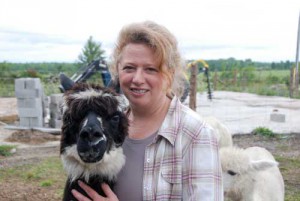LITTLE CURRENT—Just outside of Little Current, located on Morphet’s Sideroad, Manitoulin’s newest alpaca farm has emerged, Island Alpacas and Carding Mill, owned by Heather Crowder and her family, who originally hail from Lively but decided to make a ‘creative’ move to the Island.
Ms. Crowder explained that she worked as a mining engineer for years, but felt the need for change and wanted to put her creative talents to good use. She and her husband will be selling the family home in Fairbanks in the next year or so and making the move to Manitoulin a full-time and permanent one, she explained.
Farming, especially alpaca farming, is new to her, but Ms. Crowder says the learning curve has been a joy and the fact that alpacas are fairly easy to look after helps too. She has 18 of the downy soft creatures so far, a purchase from the former Noble Alpaca Farm on Scotch Line, including well-known alpaca Shadow, who is remembered from the Noble farm for her cuddly nature, which hasn’t changed a bit.
“Once I heard she was selling (Rochel Totman and husband Glen), I started to do some research.” Ms. Crowder explained, adding that she even travelled to an alpaca fibre sock factory in Quebec to see how it was done and gain ideas for her own venture.
While she hopes the sight of alpacas from the roadway will draw customers in, Ms. Crowder’s homey farm shop will certainly add to the appeal. She proudly shows off her felting machine, purchased last month from Kentucky and one of only a few in the entire country. The machine turns the alpaca fibre into felt, which can then be used for all kinds of things, including insoles that are known for their warmth and wicking ability; cool in the summer and warm and toasty in the winter. The farm also has a carding machine, which the raw fibre is fed into, turning it into batting. Once the fibre is in batt form, it can then be fed into a loom to create yarn.

Alpaca fibre is said to be eight times warmer than wool, comes in 22 different natural colours, has no lanolin and therefore no itch and is naturally hypoallergenic.
Ms. Crowder herself crochets and knits, but had never used alpaca yarn before purchasing the herd. Following the placement of an ad in this newspaper seeking local knitters, the farmer now has four women who take the yarn (sourced from other mills for the time being) and make creations—largely hats, socks and mittens currently. They are then paid by the piece. She has also solicited Sheguiandah woodworker Julie Shortt to create wooden buttons for her creations that feature a hand-carved alpaca on each one. The buttons themselves have also been a popular item for sale.
Ms. Crowder has big dreams for her piece of pasture, one that she is hoping to turn into a vertical operation—from pasture to product right there on Morphet’s Sideroad—and is anxiously awaiting word from the Northern Ontario Heritage Fund Corporation to see whether the government agrees. The majority of all alpaca fibre is sent o a mill on the East Coast where producers need to pay $1,800 in shipping and wait between nine months and a year for turnaround. There is obviously a need for more like it, as alpaca farms continue to crop up in the province, and Ms. Crowder hopes to be that person in the North.
The farm store currently offers the Island-knit products, but also offers thermal socks comprised of alpaca wool mixed with nylon for durability (from the Quebec factory), slippers, children’s sweaters, insoles, braided rugs, yarn and roving (fibre not yet spun into yarn) too.
“We also make Croc liners which wick the moisture from your feet,” she adds, noting that they have been a popular seller.
Ms. Crowder also hopes to soon produce pet beds, cat caves, horse blankets, rugs and much more and will also take custom orders.
Visitors are welcomed and encouraged to visit the farm at 205 Morphet’s Sideroad. The farm is open from Monday to Friday from 9 am to 5 pm, Saturdays from 10 am to 4 pm and Sundays by appointment only. For more information, please call Ms. Crowder at 705-805-0254.



